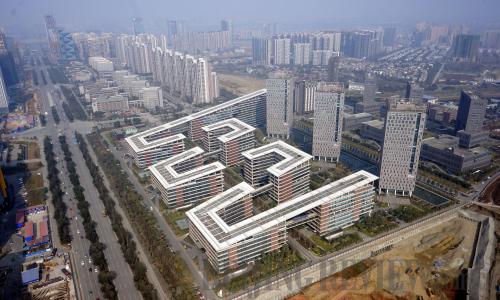|
 |
|
FIRST-CLASS PARK: An aerial view of the Chengdu Tianfu Software Park, the largest specialized business IT park in west China, where over 250 IT companies are located, including IBM, Huawei, Alibaba, Siemens and Tencent, since 2005 (XINHUA) |
When Intel announced that it would invest $500 million to build a factory in Chengdu in 2003, most people in the industry outside China asked, "Where is Chengdu?" Now, Intel's manufacturing base in the capital of southwest China's Sichuan Province has become the company's largest assembly and testing center. In May, the 1.3 billionth chip rolled off the production line. Nine chips per second are produced there.
"The Intel Chengdu production base has been responsible for over 50 percent of Intel's global chip production and 60 percent of CPU output since the first half of 2011. It's also a center for testing and producing on a large scale the latest Intel products," Bian Cheng, General Manager of Intel Products (Chengdu) Ltd., told Beijing Review.
Ten years ago, 70 percent of the products that Chengdu shipped out were clothes and agricultural products. Today, IT products are the norm.
Major international players in the electronic information industry have clustered in the city, including IBM, Accenture, SAP, Alcatel-Lucent, Nokia-Siemens, Singtel, DHL, Wipro and Symantec. "A higher-level concentration of industrial players will benefit all in the industrial chain. For instance, after Lenovo, Intel's downstream firm, set up its Chengdu base, it took us only half an hour to ship our chips to Lenovo," said Bian.
In 2012, the output value of the city's electronic information industry totaled over 300 billion yuan ($48.96 billion), ranking fourth nationwide after Beijing, Shanghai and Guangzhou, capital of south China's Guangdong Province. The electronic information sector has become one of the pillar industries in Chengdu, accounting for over one third of its GDP.
Chengdu's GDP reached 813.89 billion yuan ($132.83 billion) in 2012, up 13 percent year on year—a growth rate much higher than the national average. As an inland city, Chengdu has attempted to seize opportunities by upgrading its industrial structure to include more advanced industries.
Top-notch gov't service
Traditionally known as the hometown of the panda, 238 Fortune Global 500 companies have established presence in Chengdu.
"I think China's 'Go West' campaign will continue and Chengdu will become a hotter place for investment, especially after the 2013 Fortune Global Forum and more foreigners get to know what kind of miracle the city has created during the past decade," said Bian.
When Damco, a logistics company affiliated with the world's top shipping and oil conglomerate A.P. Moller-Maersk Group, considered building a customer service center in China in 2009, it looked into a number of cities, including west China's Chongqing Municipality, Xi'an, capital of northwest China's Shaanxi Province, Nanjing, capital of east China's Jiangsu Province, and Chengdu.
"Only one day after we talked to Chengdu government officials about the potential cooperation, a complete and detailed proposal was handed to us. This is the most effective and quickest response we received from a local government during our investigation of Chinese cities," said Shao Wei, Senior Director of the Maersk Global Service Center Chengdu.
Five months later, Maersk decided to locate its global service center in Tianfu Software Park in Chengdu, citing as one reason the government's strong desire to learn from multinationals. To date, the center employs over 1,000 workers and provides professional supply chain services to 250-plus global clients.
Bian said that Intel chose Chengdu after a careful, all-round evaluation of the city's investment environment.
"After communicating with the Chengdu Municipal Government, we found that it has forward-looking plans for supporting hi-tech companies. It has a vision to cooperate with multinationals, making it easier for us to operate," he said.
|
